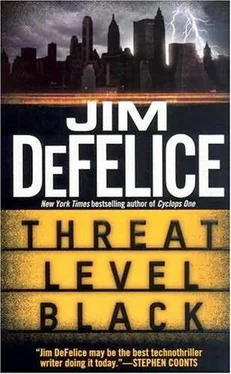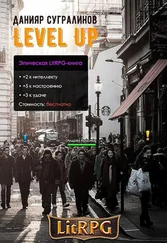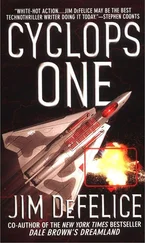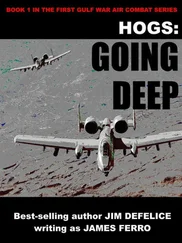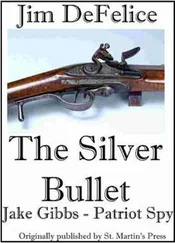“I can’t, Mac. It’s way too threatening.”
“Then you have your staff do it,” said McIntyre. “Have them talk to the military people, government agencies. They get the ball rolling.”
“That will take way the hell too long,” said Howe. “I can’t just hang back.”
“Sometimes you have to if you want to get things done,” said McIntyre.
“So, what did it mean that the three slimebag terrorists who’d live in the Washington Heights apartment had actually lived there, with stuff and everything, unlike the apartment Faud had blown up?”
“Jesus, Andy, that’s a real question?” asked Macklin as Fisher sat down on the couch in the living room. “It means they lived here.”
“So Faud must have another place to stay? Besides his apartment.”
“That a question or a conclusion?”
“Both.”
“Maybe you should talk to them yourself. They’re at the new Special Prisoner Holding Area on Plum Island.”
“What are they going to tell me?”
“Jeez, if I knew that, you wouldn’t have to talk to them.”
Fisher got up and went to the kitchen, where Macklin had left the inventory of the items they’d removed. The DIA techies had managed to retrieve most of the files from the hard drive; the inventory included a rundown. It appeared that the three students were running a term-paper Internet site from the apartment. It brought in about six or seven hundred bucks a week, barely enough to support the rent and other expenses.
“What sort of tickets did they have?” Fisher asked Macklin, looking at the inventory. “Parking tickets? They have a car?”
“No. Bastards had tickets to the NCAAs. They even have four tickets to tonight’s finals. Four of ’em. Those suckers are so valuable, I had to take custody of them myself.”
Fisher gave him an odd look.
“I’m just kidding, Andy.”
“Where are they being held?” asked Fisher, grabbing his coat.
The Special Prisoner Holding Area had been constructed off the shore of a secure testing area controlled by Homeland Security at the tip of Long Island. It consisted of two large barges that had once been leased by New York City as temporary jail facilities. The water around the barges was filled with coiled razor wire; there were two posts with machine guns on land and a pair of small patrol craft, also armed with machine guns, patrolling in the water. Fisher had to run a gamut of high-tech sensors to get onto the barge where the three men were held; he was wanded twice and had to turn over his cell phone, all of his weapons, and most importantly his cigarettes before being allowed inside. Even Macklin, who was head of the task force and had been there several times before, was carefully searched before being cleared. The doors were all operated by remote control; none of the guards had keys of any kind.
The first man had given his name as Ali Muhammad, which was a little like calling himself James Smith. Immigration had just identified him as an Egyptian student named Ali al Saad, which was also probably an alias, though Fisher was not particularly interested in his specific identity and said nothing when Macklin quizzed him on it.
“ Syracuse or Kentucky?” Fisher asked the prisoner.
Ali gave him a blank stare.
“Thanks,” said Fisher.
“That’s it?” said Macklin.
“That’s it,” said Fisher. “Bring in the next one.”
Howe tried to follow McIntyre’s advice and hang back, but when one of the generals he’d contacted earlier got back to him and offered to forward the preliminary report, Howe couldn’t stop himself from saying yes. The report wasn’t much more than what he’d already seen-it was a field briefing forwarded from the scene to a CIA reviewing team-but it did include a set of digital photographs. The shots were a bit grainy, but one thing that caught Howe’s attention were two large arrangements of tubes at one corner. At the center of each one was a large, elongated tube that looked like the cans used on dairy farms to collect milk. Around them were clusters of smaller cans or pipes, like coffee cans soldered on. They looked somewhat like rocket motors, though Dalton pointed out they were too large to fit in the rear of the UAVs.
“Besides, if they’re rockets-and I’m not saying they are-they’d be solid fuel boosters,” added the scientist. “If you used them to propel the plane, you couldn’t shut it off. You’d have the rocket ignite, boost you to altitude maybe, then glide back?”
“Why not?” asked Howe.
Dalton shrugged. He leaned over, trying to get a better look at the photos. “Not enough detail to know what’s going on.”
“I know the guy who took the photos and wrote the report,” said Howe. “Maybe he can tell us something more.”
“Can’t hurt.”
It took Howe’s secretary only a half hour to run down Major Tyler in Korea -one more measure of the power and reach of NADT. It was a little past midnight there, and Tyler sounded as if he’d dragged himself from bed.
Which, he told Howe, was the case.
“Only for you, Colonel.”
“I appreciate it. I’m looking at some pictures you took at the UAV base. There’s some tubes and things on the side of the hangar. Would you mind if one of my technical people went over it with you?”
“Tell you the truth, Colonel, I haven’t a clue what any of that stuff is. I took a whole set of pictures just because of that. I’m lucky I knew which one was the UAV.”
“There are only three pictures attached here, and only one of the hangar.”
“Yeah, probably all they forwarded because of the bandwidth. I have the flash card.”
“Can we get it?”
“I think we can e-mail it over a secure network.”
“Let me see about the arrangements.”
An hour later Dalton went over the images with Howe.
“My guess is that it’s some sort of booster system. This here, this is definitely part of a solid fuel rocket system: The design looks pretty basic, something you’d see around 1960, 1965, but it looks sound.”
Dalton slapped the keys, bringing up a photo of the underside of the robot plane. “It would elevate the aircraft: It would be like something you’d use for a takeoff. I’m not a propulsion expert, but I know rocket-assist packs have been used to help heavy bombers off airfields. This might be something similar, except that my feeling is this aircraft could take off from a really short field as it is.”
“So why would you need them for a UAV?” said Howe.
“I don’t think that you would. Maybe for a really quick takeoff, but this can use a short field as it is.” Dalton shrugged. “Until we have that UAV here, it’s impossible to say if they’re related.”
“How much of an airstrip would those aircraft need to take off?” asked Howe.
“Have to have the engineers do the numbers once they have the aircraft and can model it, but I’d guess not much. Any military field in North Korea would have been more than adequate. I think they could come off a road. Maybe even my driveway.”
“Could the boosters lift them straight up?”
“Not straight up. You’d need a bit of an open area to climb out and get altitude, but not much. I don’t see why you’d need it, to be honest. You have the airfield, so this is a lot of trouble for nothing.”
“I’m guessing there’s a reason,” said Howe. “We just haven’t figured it out yet.”
Dr. Blitz eased away from the Philippine ambassador, squeezing into the press of UN delegates in the center of the reception. The President’s speech had gone reasonably well, though a final assessment on audience reaction wouldn’t be possible until later in the day, after the delegates began cabling home with their true reactions.
Читать дальше
